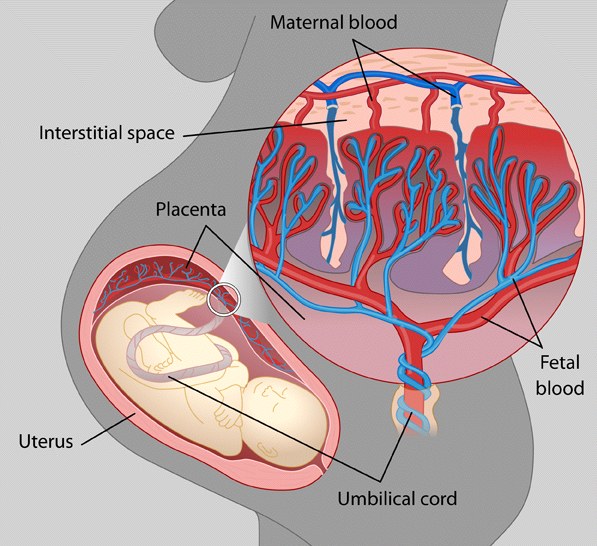When a pregnant woman drinks alcohol, it enters her bloodstream that lines the stomach and small intestines.
Learn more about the absorption of alcohol
Once in the bloodstream, the alcohol travels throughout her body, to her brain where it elicits many effects (including intoxication), to her liver where it is metabolized, and even to the fetus, where it can cause many devastating effects.
 Figure 5.4 When a woman drinks alcohol, her fetus “drinks” too!
Figure 5.4 When a woman drinks alcohol, her fetus “drinks” too!
But how does the alcohol actually get to the fetus? There is a barrier “organ” that allows the baby to get the proper nutrients and oxygen while removing unnecessary wastes and carbon dioxide through the mother’s blood supply. This “organ” is called the placenta. The fetus is attached to the placenta by its umbilical cord (it is cut at birth to form your belly button). In the placenta, the maternal blood supply is separate from the fetal blood supply (see Figure 5.5), but there is an interstitial space through which nutrients, oxygen, and wastes can be transferred.
Because of the physiochemical properties of alcohol (it is polar and small in size), it can easily diffuse from the maternal blood to the fetal blood through the interstitial space of the placenta. Once alcohol has entered the fetus, it travels throughout the fetus’s body where it can damage the face, brain, or any other organ that is developing at the time of exposure.
Learn more about the properties of alcohol
 Figure 5.5 In the placenta alcohol follows nutrients across the interstitial space from the maternal to the fetal blood supply. The baby gets as much alcohol as the mother gets.
Figure 5.5 In the placenta alcohol follows nutrients across the interstitial space from the maternal to the fetal blood supply. The baby gets as much alcohol as the mother gets.
Alcohol is eliminated from the mother’s body by metabolism. Unfortunately, the fetus cannot metabolize alcohol the same way the mother does. The only way to eliminate the alcohol from the fetus is diffusion through the placenta, back to the maternal blood supply. This may result in higher levels of alcohol in the fetus for an extended period of time.
Learn more about the metabolism of alcohol